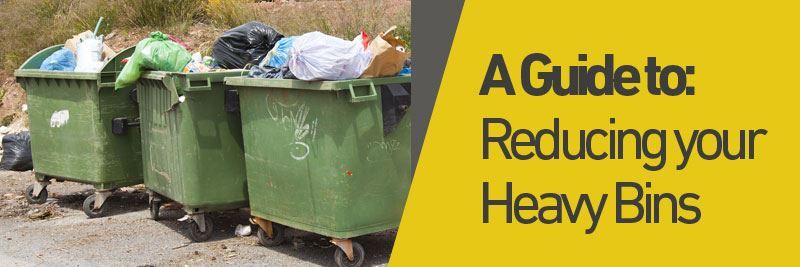One of the main problems our bin men face, as highlighted in our A Day in the Life piece, is the contents of the bins they collect. More specifically, their tendency to be vastly overweight. This causes the following problems:
- Safety concerns for the bin men
- The inability for waste trucks to physically carry the waste
- Potential missed collections leading to heavier and heavier bins for you, the customer
As a customer, it’s your responsibility to maintain the condition of your bin, as well as to ensure that it isn’t overfilled at the time of collection, or well in excess of the advised weight limit.
The answer to this issue is waste segregation. In this article, we provide top tips on segregating waste so that your general waste bins have lighter contents.
Start Recycling
A lot of the time, recycling can be much cheaper than dumping all your waste into one general bin. Adding one or more mixed recycling bins to you Waste Management will divide your masses of waste; two light bins is preferable to one heavy bin which strains the physical ability of bin men or exceeds your contractual allowances.
Separate your Food Waste
Although the odd banana peel might not seem too heavy, food waste is one of the biggest culprits of tipping the general waste scale. This is because food waste compacts into a very small surface area whilst retaining a lot of water in the process.
Compacted food waste makes a bin look a lot less full than it is, whilst adding lots of weight due to the mass of compressed food and water. To combat this, the best course of action is a separate food recycling collections, which provide double benefits by sending food to Anaerobic Digestion plants.
This is a great segregation technique even if you don’t produce tonnes of food waste, because in most cases you can specify to frequency of the service you need.
Use a Skip
From time to time, businesses may throw out some old furniture, a bit of rubble from a rebuild or other miscellaneous items. Throwing things like this into your general waste bin, even as a one-off, can all add up to a very heavy bin, and potentially a missed collection. If you think you might need a skip, just rent a skip – it’s really quite easy.
You’ll do your business no favours by letting bulky waste ruin your regular collections. Besides, a skip will most likely end up cheaper than getting a fine or a missed collection.
Be Wary of Glass!
Glass can really weigh your bin down. It’s deceptively heavy, particularly when it smashes and therefore fits into small spaces or when it still has contents inside. What’s more, glass in general waste bins poses an all-too-common safety hazard for bin men – no one wants to be injured by smashed up shards poking out of a bin liner.
For these reasons, it’s always advisable to get a separate glass recycling bin, which will reduce your standard bin weight, keep waste workers safe and benefit the environment.
Get Another Bin
One of the easiest ways of cutting down the weight of your bin is to, quite simply, spread the load. A lot of companies charge by the weight of a collection, and not per bin – oftentimes getting an extra bin and splitting your waste won’t end up costing you much more and will allow you to rest easy knowing your collections will be viable and fine-free.
If you’re frequently overfilling your bin, re-agreeing your waste limits is the best way to stay compliant with your contract, and makes collections easier for your bin men.
Reduce your Waste
Instead of thinking of ways you can spread out your waste, how about assessing the amount waste you produce? Consider back-to-basics efforts of simply putting less into your bins.
Check out “Let’s Stop Single-Use – Instead Reduce, Reuse, Recycle”, which will help you to minimise the production of waste across all aspects of your business.
Related content
- Efficient Waste Management Solutions for Your Business
- Commercial Waste Collections & Waste Disposal
- Expert Commercial Waste Collection Services
- What Happens to your Food Waste?

